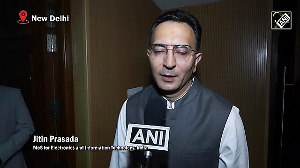Several of young jury members refused to rate the Budget publicly, in deference to the finance minister's wishes. But privately, they provided Business Standard with their assessment. The composite jury rating here does not reflect the views of any single individual.
Kumar Mangalam Birla, Chairman, AV Birla group
This is a very positive budget given the current business environment, stagnant demand and other constraints.
Particularly, the focus on infrastructure will be a trigger for overall growth and we hope the increased spending on the core sector will have a rub off effect on the rest of the economy as well.
It is also a good budget for the consumer as the cost of consumer durables will come down, if manufacturers pass on the benefits of the excise cuts.
The Budget also presents a human face as it has addressed issues of social security by taking care of people below the poverty line and has also introduced schemes such as the the Life Insurance Corporation of India's proposed pension scheme for senior citizens.
We are still studying the impact that the budget will have on our businesses, principally cement and textiles.
But the focus on development of the infrastructure sector will help spur demand in the cement sector as well.
For the textile industry, the rationalisation of custom and excise duties will lead to generation of demand.
Sunil Mittal, Chairman, Bharti Enterprises
Overall, it is a good budget with a major thrust on infrastructure development, including healthcare, which is good for the economy.
The enhanced spending on infrastructure will have a positive impact on manufacturing industry as a whole and reflect in better macro numbers.
The decision to combine private and public interest to improve infrastructure is a major step in this direction.
Specifically, for the telecom sector, the reduction in duty on optical fibre cables and capital goods is a good move for the entire telecom value chain.
Combined with the continuation of the tax holiday for another year, the Budget is bound to give a further boost to the telecom industry and should help providers provide cheaper and more accessible services.
The increase in service tax from five per cent to eight per cent has to be seen in the light of an overall increase in service tax to the consumer.
Thus, the need to rationalise the license fee structure for the telecommunication service providers becomes not only desirable but also an imperative.
Ruchir Sharma, MD, Morgan Stanley
The financial market's reaction to the Budget was rather eloquent: stocks barely budged , the rupee traded soporifically, while bonds staged a late rally only after some surprise RBI follow-through. Obviously, the markets did not share the even larger than usual enthusiasm on display by the various industry groups.
This was largely because markets had already priced in a lot of the so-called 'capital market' friendly measures announced. Additionally emerging market investors are much more demanding in risk averse conditions currently prevailing globally and so would have liked in a grander reform design in the budget. But maybe the act may no longer be the all-encompassing reform statement it used to be.
After all, the reform highlight of the past year has been the privatisation programme and that had very little to do with the Budget.
So the hope is that the reform momentum will gain traction from outside the Budget speech as well.
Here one issue that needs to creep back into our collective consciousness is the state of the government finances. For the Indian economy to grow at 7- 8 per cent the government's balance sheet will need some serious restructuring.
Gunit Chadha, MD & CEO, IDBI Bank
A Budget with substance and should provide a fillip to the manufacturing and services sectors, banking included.
Spending on infrastructure will stimulate the economy. The withdrawal of dividend tax and long-term capital gains tax should stimulate the capital markets. Reduction in the surcharge on corporate tax, though below market expectations, will benefit industry in general.
Introduction of VAT would remove multiplicity of taxes thereby reducing cost of services.
Increase in FDI investment limits in banks from 49 per cent to 74 per cent and the withdrawal on restrictions in voting rights should see strategic investments by international investors in private banks and facilitate opening of subsidiaries by international banks.
Extension of Section 72A of the I-T Act to the banking sector should see increased M&A activity in this sector. Continuity of interest exemption on housing loans will provide a fillip to the housing sector.
Reduction in the small savings interest rates should see more deposits being channelised into the banking sector, which in turn will enhance credit flow to the industry.
Milind Barve, MD, HDFC Mutual Fund
The Union Budget continued the trend of previous Budgets of rationalising the duty structure, encouraging infrastructure spending, providing support to those industries enduring a slowdown (agriculture, tourism, textiles), encouraging areas of social benefit (education, healthcare, pharmaceuticals) and supporting capital market development.
The Budget has continued with the tax reforms. On the indirect taxes front, the government has continued with the reduction in customs duty, while further rationalising the excise duty structure. These measures form part of the Centre's continuing commitment to the WTO and of rationalising the cascading impact of domestic taxes.
On direct taxes, the removal of the surcharge on individual income tax (for incomes less than Rs 850,000) and reduction in the corporate tax surcharge by half is welcome and along with the removal of dividend tax should encourage consumer spending.
On the other hand, the government raised the service tax from 5 per cent to 8 per cent.
Anand Mahindra, vice-chairman & MD, M&M
The Budget presented by the the finance minister Jaswant Singh is growth oriented, and in fact, exceeded expectations. The budget set a sensible reform driven fiscal framework for sustained economic growth.
I am delighted to see many reforms measure covering direct as well as indirect taxes. This includes the reduction in interest rates in small savings and particularly excise duty on motor vehicles and MUVs from 32 per cent to 24 per cent.
The finance minister has set his emotional tone by telling us that his heart lay in poverty elevation and that he would first focus on addressing the lifetime concerns of ordinary citizens. He reminded us that this was consistent with his very first promise as a finance minister, which was to put more money in the pockets of ordinary people.
The attributes of his economic brand are first a sustained commitment to the reform process and a greater dependence on market mechanism. Included in this, is a critical shift in focus to consumption-led growth. This later approach gave him the courage to boldly reduce excise and custom duties and induce expansion of what could be potentially the second largest consumer market in the world after China.
The focus on road building and a large number of road projects will help the entire auto industry in the long run.
I also applaud the finance minister's attempt to boost agriculture while recognising that it is the state subject.
The finance minister has picked up the right five focus areas including education which lies at the core of the growth. In this context, the finance minister's tax break of up to Rs 24, 000 per year for the education of two children will go a long way.





